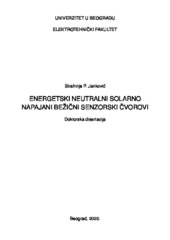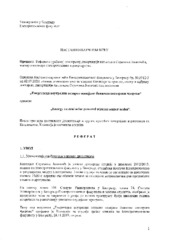Приказ основних података о дисертацији
Energetski neutralni solarno napajani bežični senzorski čvorovi
Energy neutral solar powered wireless sensor nodes
| dc.contributor.advisor | Saranovac, Lazar | |
| dc.contributor.other | Popović, Ivan T. | |
| dc.contributor.other | Milovanović, Vladimir | |
| dc.contributor.other | Rakić, Aleksandar | |
| dc.contributor.other | Rajović, Vladimir | |
| dc.creator | Janković, Strahinja | |
| dc.date.accessioned | 2020-12-25T14:44:40Z | |
| dc.date.available | 2020-12-25T14:44:40Z | |
| dc.date.issued | 2020-10-13 | |
| dc.identifier.uri | http://eteze.bg.ac.rs/application/showtheses?thesesId=7806 | |
| dc.identifier.uri | https://fedorabg.bg.ac.rs/fedora/get/o:23068/bdef:Content/download | |
| dc.identifier.uri | http://vbs.rs/scripts/cobiss?command=DISPLAY&base=70036&RID=28203529 | |
| dc.identifier.uri | https://nardus.mpn.gov.rs/handle/123456789/17709 | |
| dc.description.abstract | Baterijski napajani senzorski čvorovi omogućavaju prikupljanje podataka sa senzora koji su postavljeni na teško dostupnim ili udaljenim mestima. Ograničenje upotrebe baterijski napajanih senzorskih čvorova predstavlja konačan kapacitet baterije. U cilju produženja vremena rada do trenutka pražnjenja baterije koriste se algoritmi za optimizaciju potrošnje i perfomansi. Algoritam na osnovu zadatog kriterijuma i primenom tehnika za smanjenje potrošnje omogućava postizanje kompromisa između performansi i potrošnje, a samim tim i vremena trajanja baterije. Međutim, koliko god da je algoritam za optimizaciju efikasan, baterija će se eventualno isprazniti. Prikupljanje energije iz okoline predstavlja potencijalno rešenje problema konačnog kapaciteta baterije. Ukoliko se koristi prikupljanje energije iz okoline, cilj algoritma optimizacije menja se u maksimizaciju performansi tako da se ne ugrozi operativnost senzorskog čvora. Ovaj koncept se u literaturi naziva koncept energetske neutralnosti. Da bi se postigla energetska neutralnost, algoritam pored informacije o trenutnom stanju napunjenosti baterije treba da ima i predviđanje o energiji koja će moći da se prikupi u budućnosti. U okviru ove disertacije prvo su analizirane postojeće tehnike za smanjenje potrošnje. Prikazane su tehnike koje se primenjuju prilikom razvoja i tehnike koje se primenjuju u toku rada sistema. Nedostatak postojećih tehnika za smanjenje potrošnje u toku rada je što im je primena ograničena isključivo na opseg gde ne dolazi do degradacije performansi. To je posledica nepostojanja objektivne metrike degradacije. Predložena je nova objektivna metrika degradacije performansi sistema za rad u realnom vremenu. Metrika degradacije performansi omogućava da se funkcija degradacije pridruži svakom tasku na sistemu prema vremenskoj kritičnosti. Uvođenjem metrike degradacije omogućeno je proširenje opsega primene postojećih tehnika za smanjenje potrošnje. Na osnovu uvedene metrike degradacije predstavljena je i nova tehnika za smanjenje potrošnje koja se zasniva na kontroli utilizacije (iskorišćenja procesorskog vremena). Predložena tehnika proširuje polje sistemskih parametara, čime je omogućen fin odabir kompromisa između potrošnje i performansi. Tehnika je verifikovana u simuliranom okru- ženju, gde je za proizvoljno izabran skup taskova prikazano da predložena tehnika omogućava odabir rada sistema sa manjom degradacijom performansi i manjom potrošnjom u odnosu na standardne tehnike za smanjenje potrošnje. Nakon toga su analizirane postojeće tehnike za predviđanje dostupne energije u budućnosti. U zavisnosti od toga kako predviđaju dostupnu energiju za naredne vremenske intervale, tehnike mogu da se podele na tehnike koje koriste podatke iz prethodnih vremenskih intervala i tehnike koje koriste podatke iz vremenske prognoze. Tehnike koje koriste podatke iz prethodnih vremenskih intervala su jednostavnije za implementaciju jer su podaci uvek dostupni i mogu da daju bolje rezultate za predviđanje za naredni vremenski interval, odnosno kratkoročnu vremensku prognozu. Tehnike koje su zasnovane na vremenskoj prognozi uglavnom koriste podatke o oblačnosti, kojima modulišu podatke o solarnom zračenju za potpuno vedar dan. Nedostatak ovih tehnika je što je potrebno nabaviti podatke o vremenskoj prognozi, što predstavlja dodatni utrošak energije. Prednosti su što pružaju znatno manju grešku predviđanja za više sati u budućnosti, odnosno za srednjeročno i dugoročno predviđanje... | sr |
| dc.description.abstract | Battery powered wireless sensor nodes enable data collection from sensors placed in inaccessible or remote locations. The use of battery powered wireless sensor nodes is limited by finite battery capacity. In order to extend operation time before battery is depleted, power and performance management algorithms are used. Based on defined optimization criteria and using consumption reduction techniques, the algorithm enables trade-off between performance and power, thus extending battery life. However, regardless of how effective management algorithm is, the battery will be depleted eventually. Energy harvesting is a possible solution to finite battery capacity issue. When energy harvesting is used, the optimization goal switches towards maximizing performance while maintaining sensor node operational. This concept is referred to as the concept of energy neutrality. In order to achieve energy neutrality, the algorithm needs information about current battery state of charge, as well as the prediction of future available harvested energy. In this dissertation, first the existing techniques for consumption reduction have been analyzed. Techniques have been separated into techniques used during design and techniques used during runtime. The downside of existing techniques for consumption reduction at run-time is that their use is limited exclusively to the domain where no performance degradation occurs. This is the consequence of lack of objective performance degradation metrics. A new objective performance degradation metrics for real-time systems has been introduced. Performance degradation metrics are used to assign degradation function to each task in the system based on consequence of missing a deadline. The introduction of degradation metrics enables extension of domain of application for existing consumption reduction techniques. Based on introduced degradation metrics a new consumption reduction technique has been introduced. Introduced technique extends operating performance point parameters, thus enabling fine trade-off between power and performance. The technique has been verified in simulated environment using a selected set of tasks, where it has been shown that it can enable system operation with less performance degradation, less power consumption, or both, compared to standard consumption reduction techniques. Next, existing techniques for prediction of future available energy have been analyzed. Depending on how prediction for the following time slots is obtained, techniques can be separated into techniques that use measurements from previous time slots and techniques that use weather forecast data. Techniques that use measurements from previous time slots have simpler implementation since previous measurements are already available and can provide better prediction results for following time slots, i.e. short-term prediction. Techniques that use weather forecast data usually use the cloud cover data, which is used to modulate the clear-sky solar radiation data. The downside of these techniques is that weather forecast data needs to be obtained somehow, which incurs additional power consumption. The advantage of these techniques is that they can provide less prediction error when predicting for time slots further in the future, i.e. the medium-term and long-term prediction... | en |
| dc.format | application/pdf | |
| dc.language | sr | |
| dc.publisher | Универзитет у Београду, Електротехнички факултет | sr |
| dc.rights | openAccess | en |
| dc.rights.uri | https://creativecommons.org/licenses/by-nc-nd/4.0/ | |
| dc.source | Универзитет у Београду | sr |
| dc.subject | energetski neutralan rad | sr |
| dc.subject | Energy neutral operation | en |
| dc.subject | bežični senzorski čvorovi | sr |
| dc.subject | bežične senzorske mreže | sr |
| dc.subject | solarna energija | sr |
| dc.subject | optimizacija potrošnje i performansi | sr |
| dc.subject | Wireless Sensor Nodes | en |
| dc.subject | Wireless Sensor Network | en |
| dc.subject | Solar energy | en |
| dc.subject | Power and performance management | en |
| dc.title | Energetski neutralni solarno napajani bežični senzorski čvorovi | sr |
| dc.title.alternative | Energy neutral solar powered wireless sensor nodes | en |
| dc.type | doctoralThesis | en |
| dc.rights.license | BY-NC-ND | |
| dcterms.abstract | Сарановац, Лазар; Поповић, Иван Т.; Миловановић, Владимир; Ракић, Aлександар; Рајовић, Владимир; Јанковић, Страхиња; Енергетски неутрални соларно напајани бежични сензорски чворови; Енергетски неутрални соларно напајани бежични сензорски чворови; | |
| dc.identifier.fulltext | https://nardus.mpn.gov.rs/bitstream/id/67408/IzvestajKomisije23507.pdf | |
| dc.identifier.fulltext | https://nardus.mpn.gov.rs/bitstream/id/67407/Disertacija.pdf | |
| dc.identifier.rcub | https://hdl.handle.net/21.15107/rcub_nardus_17709 |



